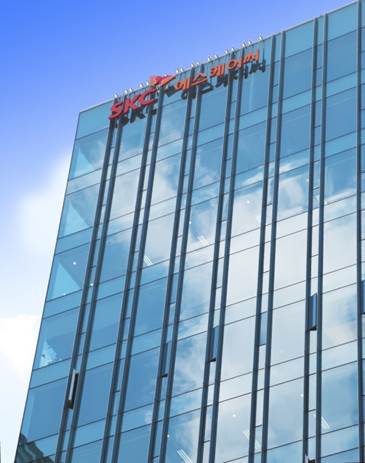NEWS
SKC Opens Gwanghwamun Building Era to Take New Leap Forward &
Kicks Off Efforts to Achieve First Year of New Vision: 'Global Specialty Marketer'
● From monopoly to sharing: To expedite the strengthening of internal competence through office design centered on the keywords of ‘communication’ and ‘collaboration’
● To strengthen businesses centered on high-value-added materials that reflect business capabilities and future trends

SKC said on May 15 that it relocated its head office to The K-Twin Tower, Jongno 1-gil (Junghak-dong) in Jongno-gu, Seoul, and has opened the Gwanghwamun era. About 350 employees will work on four to five stories in the building, including employees of SKC’s film business, chemical business, New Business’ development division, and the joint venture MCNS.
The launch of SKC's new head office is part of its efforts to realize the New Vision 'Global Specialty Marketer' the company announced on the 40th anniversary of its founding in October last year. The New Vision is testament to its commitment to 'growth as a global company by concentrating its competencies on specialty products _ base_d on a marketer's mindset that combines market demand and technical solutions.'
In order to realize this, it is necessary for its members to exert effort to 'communicate' and 'collaborate', and to respond to the fast-changing external environment and consumer demands in a timely fashion. SKC's former head office lacked space for communication and collaboration, and it was difficult to find extra space there. Hence, SKC moved its head office to a larger place and redesigned the work environment in accordance with the keywords 'communication' and 'collaboration'.
The new head office is characterized by an expansion of shared space in lieu of exclusive space. In the new head office, all employees have access to window spaces that were generally monopolized by just a handful of staff members in the past. The company set up a long 'collaboration belt' along the windows, so that staff members can meet and talk with each other and discuss business affairs in a comfortable environment. Also, the conference space was placed in the central area of the office to provide easier access to all members. Half of the space on the sixth floor has been designated as a 'communication hub' designed to promote communication and collaboration.
SKC is also changing the way staff members work. The company is improving the human resources management system to a more horizontal and flexible organizational culture in accordance with the core values of its New Vision, namely 'Speed', 'Flexibility' and 'Performance'. For the long term, the company is considering changing the way of working to embrace new concepts, such as Smart Factory, in order to proactively respond to the Fourth Industrial Revolution.
Currently, SKC is preparing to change its business model. The key is to bring products that meet the needs of customers and the market.
In the chemical business, SKC is stepping up efforts to develop specialty materials, while enhancing the market responsiveness of its existing PO downstream products, such as high value-added propylene glycol (PG). A good example is environment-friendly polyurethane material, a product introduced by Mitsui Chemicals & SKC Polyurethanes (MCNS), SKC's joint venture with Mitsui Chemicals of Japan. MCNS has introduced a new product that dramatically reduces the substance (volatile organic compounds or VOC) that causes 'new car syndrome' by combining Mitsui's technology with catalyst technology derived from SKC's 30 years of experience in polyurethane R&D. Currently, SKC is aggressively pushing to promote three areas: elastomers, functional adhesives, and lightweight materials.
In the film business, SKC plans to rapidly commercialize specialty products, such as transparent PI film, which is the core material for foldable smartphone displays, and to strengthen its business by proactively utilizing the film processing technology of SKC Haas, which will be annexed as a subsidiary. By making the most of advanced technology from SKC Haas, the No. 1 film processing company in Korea, SKC will continue to increase the competitiveness of its display film, which is one of its conventional main products, and expand its product lineup to include semiconductors and automotive applications.
In addition, the company is seeking to change its business model through new businesses. The company is stepping up efforts to expand semiconductor material development, including chemical mechanical polishing (CMP) pads, and wireless charging material development, including ferrite sheets, while striving to a synergistic effect with its subsidiary SK Bioland in areas including beauty and healthcare (BHC). The company is considering various ways to increase its competitiveness.
SKC expects that the relocation of the head office will help expedite the efforts exerted by respective divisions. "We will make a dramatic change to the working environment of our employees by transforming the way we work, and expanding communication and collaboration space by other measures," an SKC official said. "We will redouble efforts to make this year, when we have opened our Gwanghwamun era, the first year for realizing the New Vision." [End]

